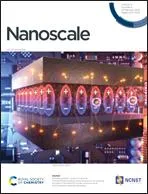Hierarchical self-assembly of colloidal magnetic particles into reconfigurable spherical structures
Literature Information
Daniel Morphew, Dwaipayan Chakrabarti
Colloidal self-assembly has enormous potential as a bottom-up means of structure fabrication. Here we demonstrate hierarchical self-assembly of rationally designed charge-stabilised colloidal magnetic particles into ground state structures that are topologically equivalent to a snub cube and a snub dodecahedron, the only two chiral Archimedean solids, for size-selected clusters. These spherical structures open up in response to an external magnetic field and demonstrate controllable porosity. Such features are critical to their applications as functional materials.
Related Literature
IF 6.222
Non-aqueous neptunium and plutonium redox behaviour in THF – access to a rare Np(iii) synthetic precursorIF 6.222
A robust multifunctional ligand-controlled palladium-catalyzed carbonylation reaction in waterIF 6.222
MnO/C cubo-polyhedrons derived from α-MnO2@ZIF-8 as anode materials for high-performance lithium-ion batteriesIF 6.367
Microscopic insights into long-range 1D ordering in a dense semi-disordered molecular overlayerIF 6.222
Engineering nanoporous organic frameworks to stabilize naked Au clusters: a charge modulation approachIF 6.222
Sensitive and specific detection of tumour cells based on a multivalent DNA nanocreeper and a multiplexed fluorescence supersandwichIF 6.222
Back coverIF 6.222
A hollow neuronal carbon skeleton with ultrahigh pyridinic N content as a self-supporting potassium-ion battery anodeIF 6.367
Palladium-catalyzed silaborative carbocyclizations of 1,6-diynesIF 6.222
Source Journal
Nanoscale

Nanoscale is a high-impact international journal, publishing high-quality research across nanoscience and nanotechnology. Nanoscale publishes a full mix of research articles on experimental and theoretical work, including reviews, communications, and full papers. Highly interdisciplinary, Nanoscale appeals to scientists, researchers and professionals interested in nanoscience and nanotechnology, quantum materials and quantum technology, including the areas of physics, chemistry, biology, medicine, materials, energy/environment, information technology, detection science, healthcare and drug discovery, and electronics. For publication in Nanoscale, papers must report high-quality reproducible new work that will be of significant general interest to the journal's wide international readership. Nanoscale is a collaborative venture between the Royal Society of Chemistry Publishing and a leading nanoscience research centre, the National Center for Nanoscience and Technology (NCNST) in Beijing, China. image block The journal publishes weekly issues, complementing and building on the nano content already published across the Royal Society of Chemistry Publishing journal portfolio. Since its launch in late 2009, Nanoscale has established itself as a platform for high-quality, cross-community research that bridges the various disciplines involved with nanoscience and nanotechnology, publishing important research from leading international research groups.
Recommended Compounds
Recommended Suppliers
 Geveke Klimaattechniek bv
Geveke Klimaattechniek bv Frank Gutjahr Chromatographie
Frank Gutjahr Chromatographie Shanxi Xinrui Biotechnology Co., Ltd
Shanxi Xinrui Biotechnology Co., Ltd Berndorf Band GmbH
Berndorf Band GmbH WEVO-CHEMIE GmbH
WEVO-CHEMIE GmbH Hebei Jingxian Xinyuan Rubber Chemical Co., Ltd.
Hebei Jingxian Xinyuan Rubber Chemical Co., Ltd. Chifeng Ruiyang Chemical Co., Ltd.
Chifeng Ruiyang Chemical Co., Ltd. Celtical Life Science Technology (Beijing) Co., Ltd.
Celtical Life Science Technology (Beijing) Co., Ltd. Shanxi Chenshi ZhiGuang Chemical Technology Co., Ltd.
Shanxi Chenshi ZhiGuang Chemical Technology Co., Ltd.














